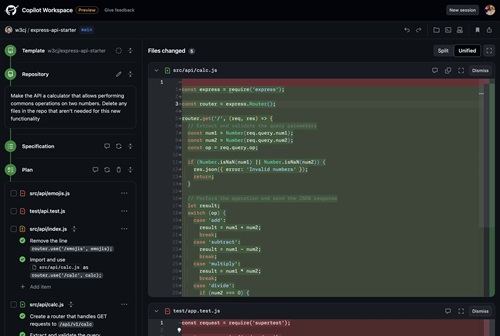News
Natural Language Coding Advances with Technical Preview of GitHub Copilot Workspace
The original "AI pair programmer" GitHub Copilot got a big boost in capabilities with the introduction of the companion Chat tool that allows developers to use natural language to code and interact with advanced AI in new ways.
Now the company has taken that concept a step further with a preview of GitHub Copilot Workspace, which provides a dedicated space for developers to work with the AI tool.
"Copilot Workspace represents a radically new way of building software with natural language, and is expressly designed to deliver -- not replace -- developer creativity, faster and easier than ever before," GitHub announced today (April 29). "With Copilot Workspace we will empower more experienced developers to operate as systems thinkers, and materially lower the barrier of entry for who can build software."
 [Click on image for larger view.] GitHub Copilot Workspace (source: GitHub).
[Click on image for larger view.] GitHub Copilot Workspace (source: GitHub).
The Copilot-native developer environment offers a task-centric experience with AI assistance from the beginning, providing a step-by-step plan in natural language that's fully editable to help developers brainstorm, plan, build, test and run code in natural language with the help of AI-powered agents.
"Ideal for navigating unfamiliar programming languages or frameworks, Copilot Workspace acts as a cloud IDE companion, deeply integrated with your project," explains a new video. "As your ultimate coding partner, it excels in repo-wide edits and fosters programming collaboration. Whether addressing GitHub Issues or optimizing your task-centric workflow, Copilot Workspace is designed to improve your coding efficiency through its AI-generated code capabilities."
Another video outlines the workflow:
- Shaping the specification
- Proposing the plan
- Implementing the plan
- Check the code with the integrated terminal or Codespaces
- Raise the pull request
- Quality checks with GitHub Actions and Code Scanning
Developers can sign up to join a waitlist for the technical preview here.
About the Author
David Ramel is an editor and writer at Converge 360.